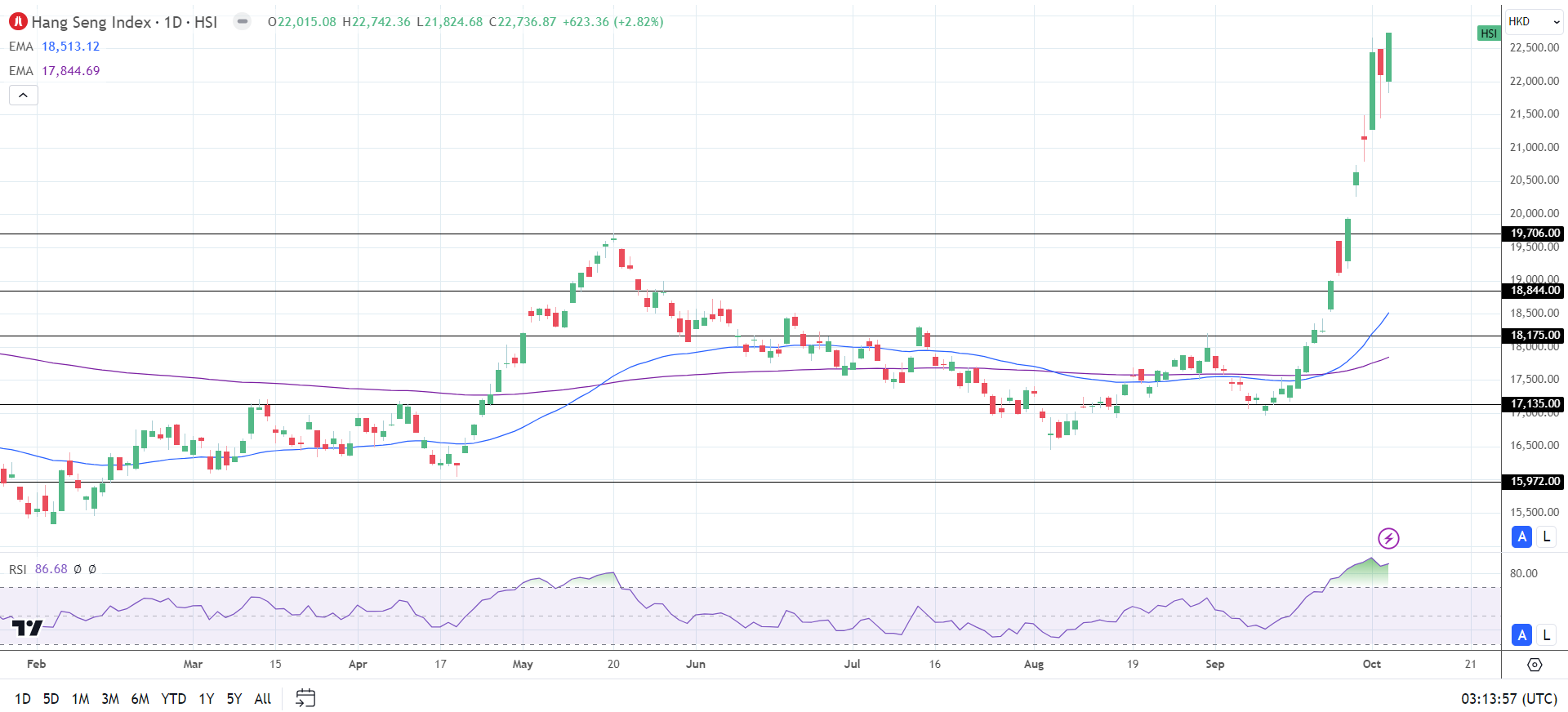
US Equity Markets Extend Weekly Gains on Soft Landing Bets
The US equity markets extended their weekly gains in the week ending October 4. Notably, the Dow advanced by 0.09%. The Nasdaq Composite Index and the S&P 500 gained 0.10% and 0.22%, respectively. Investor optimism about a possible soft economic landing contributed to the gains.
US Economic Indicators End 50-Basis-point Rate Cut Bets
US labor market and service sector data lowered investor expectations of a 50-basis point November Fed rate cut. The ISM Services PMI increased from 51.5 in August to 54.9 in September. Higher service sector activity could boost the US economy, contributing about 80% to GDP.
Job openings unexpectedly increased in August, while the US Job Report surprised the markets. The US unemployment rate dropped to 4.1% in September, with nonfarm payrolls surging by 254k.
The US equity markets faced mixed sentiment. Investors weighed the prospect of a less dovish Fed rate path, reinforcing hopes of a soft US economic landing. Furthermore, an escalation in the Middle East conflict tempered demand for riskier assets.
China Stimulus Measures Resonate in National Week
China’s recent stimulus measures bolstered demand for HK and Mainland-listed stocks. Investors also reacted positively to the People’s Bank of China (PBoC) announcing plans to cut mortgage rates for first and second homes by October 31.
China’s Private Sector PMIs Disappoint
Hopes that the policy measures will boost the ailing Chinese economy mooted the impact of weaker-than-expected private sector PMIs from China. Crucially, the Caixin Manufacturing PMI fell from 50.4 in August to 49.3 in September. The unexpected contraction highlighted the need for stimulus measures to bolster the economy.
Investors largely ignored the PMI data, focusing on the likely effectiveness of stimulus measures on demand and the broader economy.
Expert Views on China’s Policy Measures
Natixis economist Alicia Garcia-Herrero remarked on the domestic demand environment, stating,
“There is very little demand for loans from small banks for two reasons. Many were very exposed to real estate and there is no demand from developers to borrow. They also lend to small and medium-sized enterprises but we cannot forget that 30% of Chinese companies are loss-making now, especially SMEs, so small banks are being careful.”
Hang Seng Index and Mainland Chinese Equity Markets Continue Rallies

HSI 061024 Daily ChartIn the week ending October 4, the Hang Seng Index rallied 10.20%, following a 13% gain the previous week. Beijing’s stimulus measures countered expectations of a less dovish Fed rate path and the escalation in the Middle East conflict.
Real estate and tech sector-related stocks continued benefitting from the shift in demand for HK and mainland-listed stock.
The Hang Seng Tech Index (HSTECH) ended the week 17.38% higher, following the previous week’s 20.23% surge. Tech stock movers included Baidu (9888) and Alibaba (9988), which rallied by 11.12% and 9.84%, respectively, while Tencent (0700) gained 9.06%.
The Hang Seng Mainland Properties Index (HMPI) advanced by 16.39% in the week, following the 30.64% from the previous week. Real estate stocks on the move included Longfor Group Holdings Ltd. (0960) (+23.62%), Shimao Group Holdings Ltd. (0813) (+137.78%), and Agile Group Holdings Ltd. (3383) (+169.84%).
On the Mainland, the CSI 300 rallied 8.48%, while the Shanghai Composite gained 8.06% on Monday, September 30. China’s markets were closed for the remainder of the week due to the National Holiday.
Commodities Diverge Amid Geopolitical Tensions
China’s policy measures continued to drive iron ore prices higher on expectations of increased demand. Spot iron ore advanced by 6.71% in Monday’s trading session prior to the Chinese holiday.
An escalation in the Middle East conflict pushed oil prices higher, while gold dipped by 0.18% to $2,653 in the week ending October 4. US labor market data and a resurgent US dollar left gold in negative territory.
ASX 200 Slides on Risk Aversion
The ASX 200 declined by 0.76% in the week ending October 4. Falling bets on a 50-basis point Fed rate cut and the Middle East conflict left the Index in negative territory.
Notably, Aussie banks tumbled, with Westpac Banking Corp. (WBC) and ANZ (ANZ) seeing losses of 5.22% and 2.63%, respectively. Fading expectations of a 50-basis point Fed rate cut dampened demand for high-yield stocks.
Mining stocks also contributed to the weekly loss. BHP Group Ltd. (BHP) and Rio Tinto Ltd. (RIO) saw weekly losses of 0.36% and 2.96%, respectively. Risk aversion impacted mining stocks, with investors locking in profits from the previous week.
However, oil stocks rallied alongside crude oil prices, with Woodside Energy Group Ltd. (WDS) gaining 9.36%.
Nikkei Index Declines Despite Yen Weakness
An escalation in the Middle East conflict impacted demand for Nikkei Index-listed stocks. The Index declined by 3% despite the USD/JPY surging by 4.57%, closing the week at 148.656.
Notable stock movers included Tokyo Electron (8035), which slid by 7.72%, while Softbank (9984) declined by 5.85%. Nissan Motor Corp. (7201) and Sony Corp. saw losses of 3.22% and 3.29%, respectively.
Outlook
As China’s markets reopen after the National Holidays, traders should closely monitor news, real-time data, and expert commentary to adjust trading strategies accordingly. Stay informed with our latest news and analysis to manage positions across the Asian equity markets.